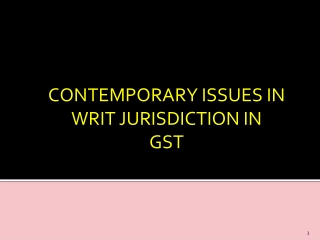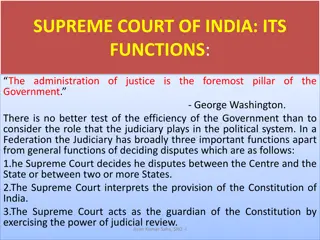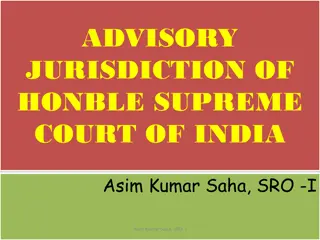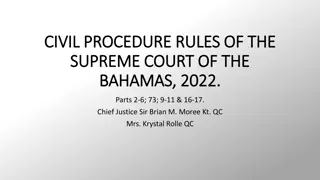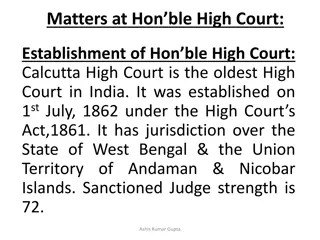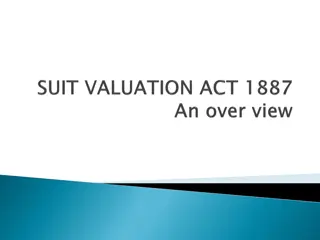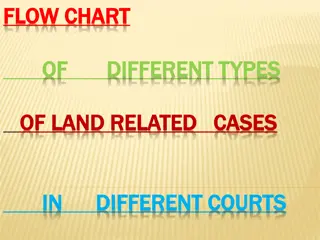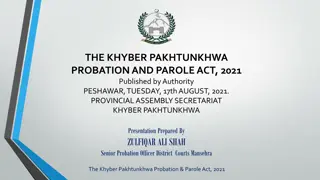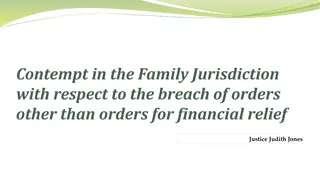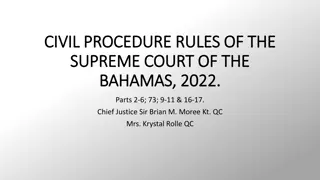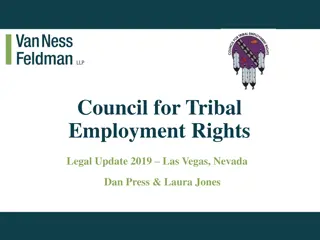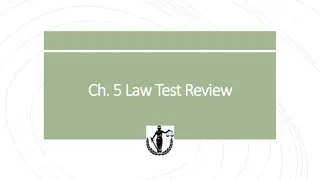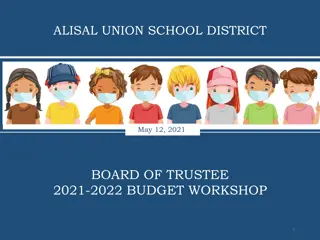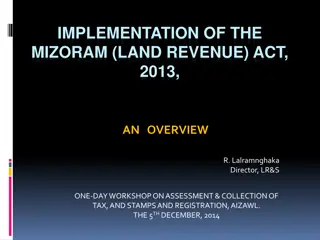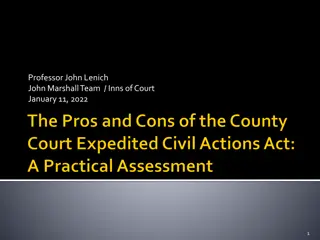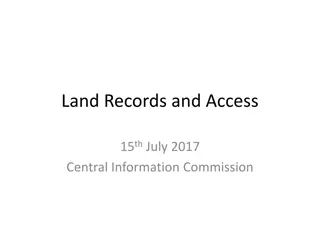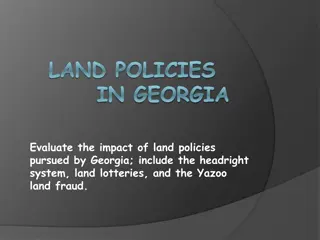Understanding Key Sections of Khyber Pakhtunkhwa Land Revenue Act 1967 and Civil Court Jurisdiction
Explore the differences between Section 53 and 172 of the Khyber Pakhtunkhwa Land Revenue Act 1967, the overlapping jurisdiction of revenue and civil courts, and the concept of Trias Politica. Learn about Civil Court jurisdiction, including the exceptions and the scope of judicial review over actions of Revenue Officers.
Download Presentation

Please find below an Image/Link to download the presentation.
The content on the website is provided AS IS for your information and personal use only. It may not be sold, licensed, or shared on other websites without obtaining consent from the author. Download presentation by click this link. If you encounter any issues during the download, it is possible that the publisher has removed the file from their server.
E N D
Presentation Transcript
Difference between Section 53 and 172 of the Khyber Pakhtunkhwa Land Revenue Act 1967and Overlapping Jurisdiction of Revenue and Civil Courts By 1 Muhammad shoaib Civil Judge-V Mansehra
2 Trias Politica /Trichotomy of Power The idea is to ensure that each and every state organs/pillars perform their respective functions with in the stipulated limits and constraints. To maintain harmony and balance among the three pillars of state Legislature, executive and judiciary To ensure independence of each organ To minimize interference between organs of the state. No authority, except where allowed by law, can encroach on the jurisdiction of others. Separation of Power Check and balance system
3 What is meant by Civil Court Jurisdiction The Courts shall (subject to the provisions herein contained) have jurisdiction to try all suits of a civil nature excepting suits of which their cognizance is either expressly or impliedly barred (Section 9 CPC). Civil Court is a court of ultimate jurisdiction. Its jurisdiction is base on the well-known Latin maxim Ubi Jus Ibi Remedium meaning, where there is right, there is a remedy The ouster of Civil Court jurisdiction can not be straight away inferred in routine. No one can be left remediless
Sec 53 4 Suit for Declaratory Decree by a person aggrieved by an entry in record of rights It is an exception to section 172 sub-section (2), clause VI of K.P Land Revenue Act 1967 Its purpose is to declare the civil rights and title of the parties (1996 SCMR 78, 1992 SCMR 1832) It s a judicial function Its identical to sec.42 of Specific Relief Act
Sec 172 Exclusion of Jurisdiction of Civil court in matter within the jurisdiction of Revenue Officer It ousts jurisdiction of civil court in all matters specifically mentioned in section 172 sub clause II of the KP Land Revenue Act, 1967 It deals with the powers and function of the revenue officers without touching the rights of the person in the land Its purpose is to ensure independence in performance of duties by revenue officer. And to perform their function smoothly, minimize the interference of any other authority/court It expressly barred the jurisdiction of civil court. 5
6 Whether an order/action of a Revenue Officer is subject to Judicial Review?
7 The answer is YES It is well settled that even if jurisdiction is excluded, the Civil Courts have jurisdiction to examine into cases where the provision of act have not been complied with or the statutory tribunal has not acted in confirmatory with the fundamental principles of judicial procedures (AIR 1940 PC 105) Where the executive authority has acted ultra vires (AIR 1948 PC 33, PLD 1947 PC 317, PLD 2020 Peshawar 105) Orders passed or act done are void, without jurisdiction or based on mala-fide, fraud (2009 SCMR 1058, 2008 SCMR 1577, PLD 1958 S.C)
Overlapping Jurisdiction of Revenue and Civil Court The stage from where the jurisdiction of revenue officer ends is where the jurisdiction of civil court begins. If law allow him to continue to exercise such jurisdiction it overlaps and it is not a step in aid of justice as it empowers an officer of executive branch to exercise powers of judicial organs of State. 172 (2) sub clause 6 and Section 53 The filing of a suit for correction of revenue record amounts to assume and draw a parallel authority in violation of the independence of judiciary and in conflict with the express provision of Specific Relief Act-1877 and section 53 of the KP Land Revenue Act, 1967 itself. 8
Overlapping Jurisdiction of Revenue and Civil Court Title Disputes (Sec 141 sub sec 5 clause B) Where the revenue officer continues to proceed with the trial despite dispute of title and his order is to be treated as order/decree of a civil judge of a civil court which is made appealable before a district Judge. A division bench of Peshawar high court Peshawar while giving judgment in the case of Ali Azeem Afridi, Advocate High Court Peshawar Vs. Federation reported as PLD 2020 Peshawar 105 declare sec 141 of Land Revenue Act 1967 ultra viries and ineffective. Overlapping Jurisdiction of Revenue and Civil Court 9
Overlapping Jurisdiction of Revenue and Civil Court Application for Partition (Sec 135) The above cited provision of law gives jurisdiction to a revenue officer to entertain application for partition but requires existence of one of the three conditions for exercising such jurisdiction. The essential conditions include; Where the share is recorded under Chapter VI of the Revenue Act as belonging to the applicant. (Clause (a) of Section 135 of the Revenue Act); or His right to the share has been established by a decree, which is subsisting at the date of filing the application. (Clause (b) of Section 135 of the Revenue Act); or A written acknowledgment of share in joint immovable property is executed by all the persons interested in admission or denial thereof. (Clause (c) of Section 135 of the Revenue Act). Application for demarcation (Sec 117) Exceptions Hon'able Mr. Justice Wiqar Ahmed in a consolidated judgment dated 25.01.2021 held that in those district where revenue record has not been prepared and maintained, a revenue officer would not have jurisdiction to entertain application for demarcation of boundaries of estate u/s 117 and application for partition u/s 135 of Revenue Act. Eviction of unauthorized land owners (Rule 67-A, 67-B read with section 117 and 122) 10
11 Q & A Q & A
12 Thank You Thank You







